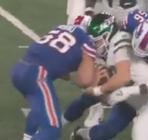|
Is SPHY a good buy right now? Any thread recommended Bond ETFs?
th3t00t fucked around with this message at 21:25 on Oct 5, 2023 |
|
|
|

|
| # ? May 31, 2024 10:24 |
|
th3t00t posted:Is SPHY a good but right now? Any thread recommended Bond ETFs? If you're currently underweight your target bond allocation, maybe? TLT is the bond ETF I've been thinking I'll eventually use when I need to shift into bonds. Bond ETFs are actually much trickier than equity ETFs.
|
|
|
|
th3t00t posted:Is SPHY a good buy right now? Any thread recommended Bond ETFs? That's a junk bond etf. Which is fine if you're looking for junk bonds, you should just be aware that that's what "high yield" means. BND is good if you're looking for a generic total bond market fund, for investment grade bonds. The most important consideration for bonds is the duration you're looking for, as that will tell you how much interest rate risk you have in the short term. esquilax fucked around with this message at 21:32 on Oct 5, 2023 |
|
|
|
Yeah. I'm at 0% bond allocation currently. Thinking about going 33% each into SHY, SHV and SPHY with the funds that I want to allocate towards bonds.
|
|
|
|
CubicalSucrose posted:If you're currently underweight your target bond allocation, maybe? Why TLT? With a 25 year duration, its going to be really volatile. Probably exactly the opposite of what you want if you aren't going to shift into bonds until later in life.
|
|
|
|
th3t00t posted:Thinking about going 33% each into SHY, SHV and SPHY with the funds that I want to allocate towards bonds. Before you invest in junk bonds, you might want to ask yourself if what you really want is more equity. Also, why would you buy two different short treasury ETFs?
|
|
|
|
drk posted:Why TLT? With a 25 year duration, its going to be really volatile. Probably exactly the opposite of what you want if you aren't going to shift into bonds until later in life. I'm going to shift in fairly early in life and expect a very long retirement duration. Planning a bond tent / rising equity glidepath to get me out of sequence risk territory as I go back up to near-100% equities. The increased reactiveness vs down years in equities should be a feature in those instances.
|
|
|
|
dpkg chopra posted:My wife and I have maxed out our Roth IRAs. Her employer matches 5% of any 401k contributions, so that's what she contributes. My employer does not match so I haven't been contributing there. Following up on this, my wife and I have agreed to put more money into our 401ks with the understanding that we can't risk certain retirement needs for uncertain mid-term goals. Two questions about this: 1) If we have 15k in liquid funds (for investing, e-fund is separate), the "correct" way of doing this is to increase her 401k contribution by as much as possible until we hit 15k, and use the liquid funds to cover the temporary income loss, right? 2) After dumping the 15k we'll probably stop contributions for the rest of the year as we'll hit or exceed 15% of our gross income dumped into retirement (including previous contributions and the IRAs). Her work offers true match so I understand that we would be "missing out" on the match for a couple of pay periods, but other than that are there any other pitfalls of halting matches? Thanks all for your help!
|
|
|
|
dpkg chopra posted:2) After dumping the 15k we'll probably stop contributions for the rest of the year as we'll hit or exceed 15% of our gross income dumped into retirement (including previous contributions and the IRAs). Pretty sure thats not how matching works. If they offer to match 1:1 up to 3% of her annual salary for example, it wouldnt matter if that 3% was one large contribution or split into a tiny amount from each pay period.
|
|
|
|
drk posted:Pretty sure thats not how matching works. If they offer to match 1:1 up to 3% of her annual salary for example, it wouldnt matter if that 3% was one large contribution or split into a tiny amount from each pay period. It can - they will often match up to x % of your salary per pay period. Some organizations do a look back but others donít (itís more work and doesnít come up that often).
|
|
|
|
As I understand it, she only gets the match up to 5% of her gross per pay period. Anything in excess doesnít get matched until the true up gets done next year. So the min/max strategy would be to contribute 22.5k - (5% of gross per pay period * total pay periods) at the start of the year Otherwise you just get that initial 5% match and then nothing until the true up 12+ months later (just to clarify Iím not suggesting anyone actually do this, just pointing it out).
|
|
|
|
dpkg chopra posted:As I understand it, she only gets the match up to 5% of her gross per pay period. Anything in excess doesn’t get matched until the true up gets done next year. This is either weird or not correct. Some places do the match per pay period. If you max out your 401k early, you lose out on some match. Some places do a true up. If you max out early, they go back some time later (mine does it in April, 4 months into the new year) and deposit the difference so that you get the full match. Your wife's company truing up 12+ months later seems *really* weird to me and you should check her plan documents to confirm this Minmaxing doesn't enter into it, not really, unless youre optimizing for the scenario where your wife loses her job between when she maxes out her 401k early and when the true up happens. In all other circumstances, you get the same amount of free money as a match. And if the 401k has a multi-year vest, you're losing even less - probably none - because all of the match would be unvested in the first 8 months or whatever . So check her plan documents.
|
|
|
|
dpkg chopra posted:As I understand it, she only gets the match up to 5% of her gross per pay period. Anything in excess doesnít get matched until the true up gets done next year. Based on what youíre saying the best plan is to match 5% per period so it gets matched immediately and you get exposure to the market. If you contribute all in January 95% of your match doesnít get deposited until 12 months later and you lose that growth over the year.
|
|
|
|
MegaZeroX posted:Any early withdrawal from a 401k carries a 10% tax on whatever you withdraw, unconditionally. If it is from a Roth 401k, then, on top of the 10% you only have to count the gains for that year's income taxes, but you can't just choose to only withdraw the principal. Its prorated, so in other words, you have to imagine that you are withdrawing equally from both the principal and the gains corresponding to the fraction of your account that occupied by both. So if you have invested a principal of $100,000, and there are $50,000 in gains, and you want to withdraw $30,000, then you have to withdraw $20,000 from the principal and $10,000 from the gains. You would have to pay a $3,000 fee for the withdrawal, and would have to pay income taxes on the $10,000. If it was a traditional tax-deferred account, then everything would be the same, except you would have to pay income taxes on all of the $30,000. My understanding was that you can access 401k money before 59.5 without the 10% penalty with some advance planning via Roth Conversion Ladders? https://www.investopedia.com/how-roth-conversion-ladder-works-5214808
|
|
|
|
Happiness Commando posted:This is either weird or not correct. Some places do the match per pay period. If you max out your 401k early, you lose out on some match. The timing of the true-up I got off the internet which states that companies do true-ups after the end of the year. The 5% per pay period I know for a fact because we see it in in her account. The true-up part was stated to her by the person inside the company who manages the plans. But you're right that one or more of these sources could be wrong, I'll check her documents.
|
|
|
|
My rule of thumb is to not count on the match - I've only worked at companies that do 3- or 5 year vests, and the longest I stayed was 3 years at the 5 year company. So I only got, I dont know, $3000, of partially vested match before I quit. Still free money! But not enough to base my personal decision making process on
|
|
|
JUNGLE BOY posted:My understanding was that you can access 401k money before 59.5 without the 10% penalty with some advance planning via Roth Conversion Ladders? https://www.investopedia.com/how-roth-conversion-ladder-works-5214808 Yes you can, but the person in question was talking about withdrawing directly from their 401k, so I was trying to be clear about that. And they also believed that they would only pay taxes on the capital gains, but if they did a Roth conversion ladder then they would need to pay normal income taxes on both the principal and the gains, assuming it was a traditional 401k and not a Roth 401k. While true for retirement stuff in general, it is especially true for roth conversion ladders that, assuming you are converting from a traditional 401k, you really should consult with a professional before committing to it. For example, if your income is constant throughout this period, your marginal income bracket was above 20% at the time of the conversion, and you plan on withdrawing from the Roth IRA a relatively short time after eligible, and assuming held investments were equities, then you will be taxed more than if you just had that money in a taxable account to begin with!
|
|
|
|
|
I'm in the process of changing my 401k investments away from a target date fund in favor of a simple three fund set up. In pursuit of this I was checking my percentages in my other accounts. I looked at my Schwab Intelligent Portfolio's account, which looks like this: Stocks % US Large Company Stocks - Fundamental 17.76 US Large Company Stocks 11.50 International Emerging Market Stocks - Fundamental 11.41 US Small Company Stocks - Fundamental 11.29 International Developed Large Company Stocks - Fundamental 10.15 US Small Company Stocks 7.56 International Emerging Market Stocks 7.48 International Developed Large Company Stocks 6.38 International Developed Small Company Stocks - Fundamental 6.34 International Developed Small Company Stocks 5.07 International Exchange-Traded REITs 2.54 US Exchange-Traded REITs 2.53 Which would mean that 49% of the stocks in my Intelligent Portfolios account are International. That seems crazy to me. Am I misunderstanding it?
|
|
|
|
Awkward Davies posted:I'm in the process of changing my 401k investments away from a target date fund in favor of a simple three fund set up. International stocks make up about 50% of the market cap of all equities, so it's not that crazy if you're trying to index the world market as a whole. Most people just like to overweight US stocks.
|
|
|
|
Ancillary Character posted:International stocks make up about 50% of the market cap of all equities, so it's not that crazy if you're trying to index the world market as a whole. Most people just like to overweight US stocks. Hunh, interesting. Another annoying thing about Intelligent Portfolios is that in order to enroll in a "US Focused" Portfolio you have to divine the correct responses to an investor questionnaire. You can't just choose "US Focused".
|
|
|
|
do not pick investments by doing a questionnaire, you're gonna wind up shoved into a whole bunch of high ER funds. You want either a target date fund or to specifically select the minimum-ER index funds that achieve the balance of domestic/international and stock/bond ratios you want. Most of the brokerages have these "intelligent" bullshit things and as you can see, they're bad.
|
|
|
|
Awkward Davies posted:my Schwab Intelligent Portfolio's account, which looks like this: Schwab is charging you pretty high fees for some of these obscure funds. If it isnt in a taxable account I would cancel the service and switch this to a three fund ASAP (or something similar and low cost). If its taxable its a little more complicated, but I would still cancel this lousy roboadvisor offering and figure out how to divest these high fee funds.
|
|
|
|
I understand when using the Roth mega-backdoor mechanism to convert after-tax 401k contributions, they have to sit for at least 5 years before being eligible for penalty free qualified withdrawals at age 59.5. After the 5 years pass, if those converted balances are rolled over to a Roth IRA, does it have to sit in the IRA another 5 years before the contribution amounts can be withdrawn penalty free before 59.5 just like regular Roth IRA contributions? Stated another way, could one build a Roth ladder for early withdrawals using mega-backdoor contributions while working, immediately roll them over to a Roth IRA upon early retirement before 59.5 and begin drawing from the converted basis right away, or would it need to marinate another 5 years in the Roth IRA to be clear to do that? SamDabbers fucked around with this message at 19:39 on Oct 6, 2023 |
|
|
|
drk posted:Schwab is charging you pretty high fees for some of these obscure funds. If it isnt in a taxable account I would cancel the service and switch this to a three fund ASAP (or something similar and low cost). If its taxable its a little more complicated, but I would still cancel this lousy roboadvisor offering and figure out how to divest these high fee funds. The account is currently down $1500 since inception. I suppose that means that now would be a good time to sell it all and just do a standard three fund.
|
|
|
|
SamDabbers posted:I understand when using the Roth mega-backdoor mechanism to convert after-tax 401k contributions, they have to sit for at least 5 years before being eligible for penalty free qualified withdrawals at age 59.5. The 5 year clock on conversions applies from the year each conversion occurred. They also round back to the start of the year for time counting purposes. So any roth conversions that you did this year (whether mega or normal backdoor) would be counted as being done on 1/1/2023, and that chunk of money would be available for tax/penalty free withdrawal in 2028 or after. Rollovers really just move money around. The money still maintains its nature from the old place to the new. Your "contributions" remain contributions and would get withdrawn first, your conversions remain conversions and get withdrawn next in order of time (oldest conversions pulled out first), and once all those are exhausted do withdrawals come from earnings.
|
|
|
|
Awkward Davies posted:The account is currently down $1500 since inception. I suppose that means that now would be a good time to sell it all and just do a standard three fund. this is a non-tax-advantaged account, right? Selling at a loss lets you offset capital gains with capital losses, or carry forward capital losses into the future - e.g. "tax loss harvesting." If it's in an IRA or 401k or something then none of that applies.
|
|
|
|
Leperflesh posted:this is a non-tax-advantaged account, right? Selling at a loss lets you offset capital gains with capital losses, or carry forward capital losses into the future - e.g. "tax loss harvesting." Non tax advantaged, yeah. Already called and closed the account and Iíll be investing in a three fund portfolio in my individual investment account.
|
|
|
|
Subvisual Haze posted:Nope, rollovers don't count for much of anything tax related. Money is being moved around but not changing its nature. Thanks for the sanity check. That's how I thought it worked but some of the articles I read weren't unambiguous enough about this particular scenario.
|
|
|
|
Any goons looking to load up on 5%+ yield longish term US treasuries in the near future? Feels like a potential opportunity to snag some very decent, low-risk returns This would be in a taxable account I guess but I'm also curious if anyone is grabbing some treasuries in their IRA or 401k.
|
|
|
|
Vox Nihili posted:Any goons looking to load up on 5%+ yield longish term US treasuries in the near future? Feels like a potential opportunity to snag some very decent, low-risk returns Sounds like market timing. Don't time the market.
|
|
|
|
Keep in mind that buying treasuries (or any higher rate fixed income security) in your IRA means not buying equities which generally goes against the purpose and intent behind the IRA tax advantage, which is to take advantage of compounding growth over a lifetime. Longer term treasuries don't compound growth like a normal stock would-- the coupons you receive (assuming it's not a zero-coupon instrument) need to be reinvested at set intervals, meaning your, whatever, 10% treasury will receive coupon payments that need to be reinvested at whatever the rate is at the time you receive that coupon (if you receive one at all), likely not even in the same credit or the same security type. Compared to a mature stock that issues a dividend (or a money market) and is automatically reinvested, it might be loving annoying having to look into what your next investment will be every time you receive the interest. And if you're lazy they quickly become less efficient than an ETF or whatever. 6 months of sitting in a sweep account is basically like paying a low fee. This isn't a big deal when you're investing with taxable money, because that money is fungible and you can simply use that cash to buy video games or whatever you want, but in a tax-advantaged account, time spent invested is hugely important.
|
|
|
|
Long term bonds can rendered awful by either further rate hikes or inflation eating away actual purchasing power. Or both, as happened in the 1970s inflation + Volcker shock.
|
|
|
|
I'm helping my sister and brother in law set up retirement savings. She is a doctor and makes 300k+ a year, he was a medical services consulting, but just gave that up to be a stay at home dad. He also does part time personal training as a 1099 employee using his SSN. He expects to make 30k a year at it. Since he will be losing his 401k at the consulting job, I wanted to set up an i401k. It sounds like its pretty easy, just need to get an EIN and follow the prompts on Vanguard. Can I roll his old 401ks into the i401k? Any pitfalls I need to look out for?
|
|
|
|
CubicalSucrose posted:Sounds like market timing. Don't time the market. Locking up some guaranteed long-term returns at a relatively higher rate than is typically available sounds like a good deal to me, in the same way that you'd want to lock in a mortgage at 3% rather than 7%, all else being equal.
|
|
|
Vox Nihili posted:Any goons looking to load up on 5%+ yield longish term US treasuries in the near future? Feels like a potential opportunity to snag some very decent, low-risk returns I am. Something like EDV might make for a good speculative position, with good (current) yields and large (potential) capital gains in the future. Now *could* be a good time to buy. I've seen some good videos about it which I'll post here later, but interest rates will go down eventually, it's just a matter of when. You just have to understand that it totally is speculation and market timing.
|
|
|
|
|
Vox Nihili posted:Locking up some guaranteed long-term returns at a relatively higher rate than is typically available sounds like a good deal to me, in the same way that you'd want to lock in a mortgage at 3% rather than 7%, all else being equal.
|
|
|
|
I think discussing the opportunity given present bond yields is relevant and interesting discussion, market timing or not. Itís an asset allocation problem. Itís also quite similar in spirit to all the I-Bond discussion previously in thread, where many people are now unwinding those positions since MoM inflation has greatly slowed. If itís truly a short term trade and not a long-term hold itíd also be fair game for the stocks thread, which is really a catch-all securities and commodities thread. Personally I still prefer shorter duration for any bond holdings. But Iíve been considering changing that.
|
|
|
|
pmchem posted:I think discussing the opportunity given present bond yields is relevant and interesting discussion, market timing or not. Itís an asset allocation problem. Itís also quite similar in spirit to all the I-Bond discussion previously in thread, where many people are now unwinding those positions since MoM inflation has greatly slowed. Yeah I was a bit curt because the question asked was kinda poorly-framed. If the poster had said something instead like: "My current asset allocation is 70% / 30% equities / bonds because I'm in the accumulation stage but also I don't sleep well at night thinking about volatility. My bond allocation is <ticker symbol>. Because interest rates have risen, I'm considering shifting my asset allocation to 60% / 40%. When would this be sensible vs. not?" It would still be a market-timing question, but it gives a better sense of the actual trade-off and opportunity cost problem. Maybe the poster does some mental accounting and has a separate bucket earmarked as "medium term, house downpayment" in which case it could be fairly reasonable. Maybe the poster "just was watching the news and saw the fed xyz and bond prices can't go any higher than this at all so gotta lock them in now right?" in which case the response is probably a bit different. Maybe as a thought exercise for the OP: Suppose instead of uhh...5%, rates went to 2.5%, 6.5%, or 8.5% tomorrow. How might one's target asset allocation shift in each of those scenarios? What about 1.5%? When would you shift OUT of bonds, if at all? Would you think that the risk premium for equities is materially different in these scenarios? Would you think that the real rates of return would be materially different?
|
|
|
|
I think sugar cube is quite savvy in this department. What does longish term mean? 5-10 years? Is this retirement money? Buy a house money? "I've got some cash I should invest, bonds are higher than they've been so I'll go with them" is a potential pitfall, decisions should be driven by your stuff not market stuff
|
|
|
|

|
| # ? May 31, 2024 10:24 |
|
Vox Nihili posted:Locking up some guaranteed long-term returns at a relatively higher rate than is typically available sounds like a good deal to me, in the same way that you'd want to lock in a mortgage at 3% rather than 7%, all else being equal. Stocks and perhaps other investments can at least in theory revalue themselves and their returns in environments of higher than normal inflation. The extent to which they can really do this is of course under debate, but at least in theory the company owned by the stock can raise prices etc. Pure fixed income assets like long-term bonds (outside of inflation adjusted return assets like ibonds or TIPS) can have deeply negative returns in their real purchasing power if the dollar is losing purchasing power at a higher rate than anticipated. I do agree though that current 5% bonds are at least worth thinking about. The ~1% bonds being offered previously weren't in my opinion. The risk vs return was dismal. Some will call that market timing, but I prefer to think of it as value investing.
|
|
|



























